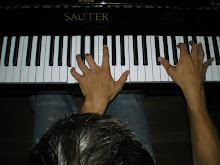Tuesday, February 28, 2006
The Transcendental Deduction of the Pure Concepts of Understanding
I actually made an analogy today to something in music to something in Kant, and now i cant remember what it was...
Sunday, February 26, 2006
expressionistic?
But im not disappointed, this is beautiful stuff, often severe, but beautiful all the same. Someone else has commented on how Gordon's deliberately mis-tuned violins work well here and its absolutely true, in his hands they create a haunting halo of sound, full of echoes and emotion. Strong discords frame many of the hamonies, but im so damned jaded to discord i would forget about it if i wasn’t thinking about other listeners. The sound is rich and as fresh as it is expressive, this music opens up some very interesting sonic possibilities.
Everyone has favorite parts of a piece. I prefer the end middle-end of part 6 and part 5 which gets more bittersweet towards the end. All of the six parts flow into each other, a continuous stream. There is not as much contrast as one could hope for, and its not as radical a departure as i may have hoped. The music is generally dark in tone and even brooding. It could be criticized for histrionics, but i wouldn’t- i doubt that some sort of hyper-morbid drama was the main focus or aim here. All in all im very happy to be able to listen to this music. There is a visceral elegance about it all... fascinating stuff.
that infamous stravinsky quote
For I consider that music is, by its very nature, essentially powerless to express anything at all, whether a feeling, an attitude of mind, a psychological mood, a phenomenon of nature, etc....
Many people have heard this quote, and at the surface it seems rather absurd and even outrageous, it is also taken out of context. If you read the rest of the paragraph you will see what Stravinsky is trying to say is not what we might read from that first sentence. I remember actually seeing this quote before listening to any of his post-rite music and being turned-off to hearing later-stravinsky as a result. "why would i want to listen to the music that was conceived under this concept? meaningless music?" Meaninlessness, absurdity, has always bothered me and nagged at me. I questioned the avant-garde for years because i was concerned about the possibility of a kind of absurdity and pointlessness in it, which is something im not going to gamble with, and it is a pointlessness which seemed stravinsky was suggesting in this quote.
But of course, Stravinsky heard an outcry from those words and decided to make his point clearer to those still stuck on the first sentence:
The over-publicized bit about expression (or non-expression) was simply a way of saying that music is supra-personal and super-real and as such beyond verbal meanings and verbal descriptions. It was aimed against the notion that a piece of music is in reality a transcendental idea "expressed in terms of" music, with the reductio ad absurdum implication that exact sets of correlatives must exist between a composer's feelings and his notation. It was offhand and annoyingly
incomplete, but even the stupider critics could have seen that it did not deny musical expressivity, but only the validity of a type of verbal statement about musical expressivity. I stand by the remark, incidentally, thought today I wouldput it the other way around: music expresses itself."
Igor Stravinsky and Robert Craft (1962). Expositions and Developments.
He puts it very well at the last bit there. I cringe now when i see that quote floating around, as if to provoke outrage, writers will publish it from time to time. Its very wrong, its very stupid to continue to take this quote out of context and present it as some sort of concrete summing up of stravinsky's aesthetics. In fact, something that i found once very upsetting i find out to be in reality, actually agreeable. Language can confuse sometimes, funny thing, this expression bit.
Friday, February 24, 2006
New recording and good news.
In other news... exciting, Animal collective is playing here on the 2nd. Then The books are coming to my school the next month. joy of joys. I've really appreciated their works, the lemon of pink is their big album and its great stuff.
excitement.
Wednesday, February 22, 2006
But it upsets some people. Last week i got my first complaint, so to speak. A guy came up to me stuttering slightly, seeming nervous "please... could you stop playing?" I wasnt even doing anything loud, just irregular and only very mildly dissonant. i said "sure" and couldn’t help but smile. I dont own the place, after all.
There are doors that open up into the lounge where i play. The next day while i was playing as i do, someone made a clear gesture by closing the doors and giving me a death glare. I heightened the mood by hitting some sweet minor seconds for them. Im sure they appreciated my gesture too.
Two days pass.... and then im playing in my normal fashion, something i assume not to be very popular and then i get some very friendly people who come and talk to me. One was a Russian grad student of sociology, a lover of prokofiev, Scriabin and other russians. I had a good talk, and the other was a guitarist and jazz-lover i'd met briefly before who seemed interested in what i was doing.
Anyway i got positive feedback, which made me feel better. After those first two days i was wondering if i had become a local musical nuisance to the people. I have received more positive feedback recently, once after playing in a manner of philip glass (no, not just empty arpeggios, think music in a similar motion or 12 parts) ...only with the transitions and progressions sped up for the sake of the listeners and myself)..and its a sort of variation of the style of philip glass, which is always a fun pastime for me, good for dexterity too. I got applause from the pool-players for my minimalism! i was shocked. I rarely get applause, even for my most blatantly and stupidly showy pyrotechnic-improvisations.
But im still of mixed feelings. I know i irritate people. Every once in a while i'll pull out some atonality.... i've certainly never gotten applause from that.
Monday, February 20, 2006

M Keiser loves mountains, so it was fun this three day weekend to go here to a friends cabin. Unfortunately the big, wild looking mountains that makes me weak in the knees were just a little farther away... but at some points around the lake you could see them. I forgot my digital camera so i had to make do with crappy cell phone camera pics.
Thank god for the three day weekend, otherwise i wouldnt be able to do the massive amount of work im supposed to be doing... So enough about my boring life.
Chase me Ladies made an post which briefly mentioned wagner, which isnt particularly thrilling in itself, but typical of the humor that floats around that site, there were good things to be had in the comments-
I enjoy killing things and Wagner.
Mind you I have a strict rule: I only kill what I need to eat.
I once strangled a child to death while listening to the Shepherd's Pipe Song from Tristan and Isolde.
He was delicious.Pig Head Sucker /15.02.06 - 2:50 am #
Maybe my sense of humor is too morbid. For example, many dead-baby jokes amuse me.
Whats the difference between a baby and an onion? ...
But wagner, now he's just sick.
Friday, February 17, 2006
I like adjectives.
The highlight of the week was tonight - i saw the vagina monologues here on campus. One of my favorite people were in it so i was (in part) supporting her, but i was also sincerely curious. I enjoyed it a lot. Humorous, aggressive, defiant, poignant, genuinely insightful and sometimes hilarious, its a great work and something i can see music applying to.
Not only did i think of PWS' interest in writing a piece about menstruation, i thought of writing something pertaining to the subject as well. Of course i thought of Menopause! the musical, but thats a different thing all together.
It also occurred to me in my one-track mine, while re-reading the previous post, that (besides my obvious deficiencies as a writer and lack of the occasional preposition) ...that minimalism is a lot like tantric sex- it deprives the listener of the pleasant chord progressions for as long as possible, thus making the tiny alteration all the greater and all the more org-- pleasing. Philip Glass, in his wisdom, stretches his music to practically-absurd lengths of time so A) we take his whole spiel a more seriously, and B) that we find tiny eargasmic joy in every little subtle change and alteration. Im writing with music in 12 parts in mind, particularly the 7th and 8th movements, which are the juicy ones.

What else? i feel like a scratched record (irony?). Minimal this minimal that. I listen to a lot more, its just one thing im comfortable commenting on since in the last two years i've really listened to more than enough Terry Riley/Glass/Reich/ and post-minimal Adams
Adams! I've been listening with great appreciation to El Nino these last few days. I remember the year it came out... i believe it was an El Nino winter. Beautiful and fascinating stuff, i cant get the babe leapt in her womb out of my head. That haunting xylophone and frankly Reichian vocal writing. But despite its gorgeous harmonies this music is still intellectually warm. There are many more words to say about this that i just dont have the time for, but in short - this is good stuff.
Though i must admit, i hate the phrase "fruit of the womb".
Sunday, February 12, 2006
Steve Reich - Music for Mallet Instruments, Voice and Organ - 1973
More austere than 18 musicians and much more elaborate than Its gonna rain or drumming, this piece makes me dizzy - a shimmering, slowly shifting kaleidoscope of beautiful sounds.
Whats interesting about Reich's work is that it presents us with dichotomies. On one hand the harmonies are very simple but lush, sustained for very long lengths of time - simultaneously rich and austere (sweet pentatonics and open fifths) and then on the other we have a radically complex set of patterns repeating short simple phrases. How many instruments are playing? how many things are going on? Like other works by Reich, the music gives the listener so many points of focus that one can continually and actively listen, yet at the same time get enveloped in these massive consonances.. preventing a sense of uninteresting monotony that other minimalist works often amount to.
But this music also takes a different kind of listening. If you listen to this piece as one big block of sound it could easily become tedious, but if you listen to all the parts going on, their slow evolution, you cant be bored. You are constantly shifting your attention from the xylophones to the voice that fades in and out, to the organ and back to the shimmering glockenspiels, and so on and so forth, so you get that sense of dizziness i was talking about.
I certainly hear the influence of gamelan in this. This is gorgeous and haunting stuff.
Friday, February 10, 2006
My Rant mentioning Kant.
Im taking a class thats supposed to be about "method imagination, inquiry" its not a bad class.. but its a lot of philosophy history stuff which i wasnt expecting (i dont think anyone who signed up for the class was). I have a liking for philosophy and i know a few things, and one of the things i know is that i cant stand Plato...but Aristotle is ok for a little while.
But what is it now... the 7th week (almost) of the quarter. We started Plato on the 1st week, basically didnt get done with his bullshit until the 3rd week, and still, every fucking lecture the professor makes some reference to Plato. "this is plato's theory applied here" "this is, essentially no different conception than Plato's" we went through Bruno, Bacon, Hume, Descartes, Shakespeare, now onto Kant. (lecture is everyday)... and here we are still talking about Plato on freakin KANT. Kant is not remotely Platonic, and he is not influenced by Plato nearly as much as my pr0fessor makes him out to be, Hume is not as influenced by Plato as he thinks he is... just drop the plato... and in the words of Hume "condemn it to the flames". Im sick of it. sick.
AAAAAAAAAAAAAAAAAAAAAAAAAAAAAAAAAH.
Ok, music. music. Just be glad we dont get stuck in the works of Beethoven and Bach so much that we cant move forward** (not to suggest one can progress beyond beethoven or bach, just move onto something entirely new). Im honestly frustraited with the classical world, though, for failing to realize the possibilities of new sounds and new music that first emerged with jazz in the 20s.
What bugs me about the serialists and the entire "classical establishment" in the 40's 50's and 60's is instead of responding to the instrumental changes of the times (guitars, drums, amplifications, ensembles of this) they just ignored the instruments and the sounds that they could produce and dismissed the new avenues that these instrumentations would open up as being below their work, being below classical music, but only being for "popular music". How absurd. What new forms could have been constructed if we had collectively given a positive response to changes that happened outside the "classical" world?
I figure its time to make amends with our friends the drummers, guitarists and lead singers. Better late than never. Music is music is music, after all.
**(theres a mildly sarcastic tone in this)
Sunday, February 05, 2006
I love the name.
First off, i need to say- i havent heard enough music by this group to make a truly substantial commentary about their music, so i'll make it brief . From the start i like what they're doing, i appreciate their approach.
The singer, when he does sing, often crones in a way that puts both David Longstreth and Bob Dylan to shame, and it feels confrontational in its roughness. Of course. singing isnt everything and if it were Dylan wouldn’t be a household name. The music is usually languid and morose, long sustained tones that linger and fade in and out- A similar feel to many pieces by Boards of Canada. This is music that appears to be expressing some sort of self-pity, but it does it with a convincing intensity.
There are echoes of minimalism, much help from electronics which create beautiful and often surreal sounds, but also elegant and lyrical string passages, the occasional plucks of a bass and a solid beat. "post-rock" they say, what ever the hell that means. Unfortunately all these sustained notes and repetitive structures can leave me yawning. I feel the need for contrast.
There are clear religious undertones in the pieces im listening to, with titles like " blown out joy from heaven's mercied hole" and "angels standing guard round your bed" and my favorite "sisters! brothers! small boats of fire are falling from the sky!" . Apparently they have a problem with titles that arent complete sentences. Some of this music, like boards of canada , a subtly sinister quality, music that is both beautiful and sickly.
Thursday, February 02, 2006
America's greatest?
While i agree that Reich's work is probably the best thing to come out of the last half of the 20th century, i would also nominate some other works for consideration. I have mentioned it before, but Samuel Barber's Knoxville, Summer 1915 is truly an american masterpiece, Copland's name has already been tossed around, so no need to continue there.
(you can yell at me for this)... Philip Glass' Einstein on the Beach may not exactly be a masterpiece, but it is pivital, as is Terry Riley's In C, so i feel it would be wrong to leave these works out.
Now i can be sly. I have already stated that Stravinsky is America's greatest composer, so i must nominate his later semi-seralist ballet Agon (which was written after he became an american citizen). There's gotta be some more stuff im missing, but i just cant think of any more right now. Thoughts? suggestions?
EDIT: I agree with Michael that the premise of the post is a little ridiculous... but as long as no one takes it too seriously- i think its fine. Also, i think its very silly to think that we can all agree upon one piece as the example of america's greatest classical composition, so thats why i presented several "nominations".
